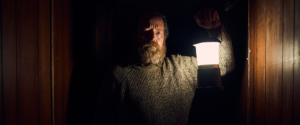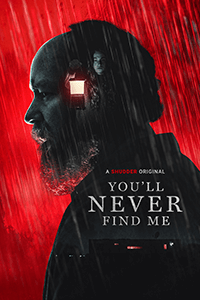
You’ll Never Find Me
3 Stars- Director
- Indianna Bell, Josiah Allen
- Cast
- Jordan Cowan, Brendan Rock
- Rated
- Unrated
- Runtime
- 96 min.
- Release Date
- 03/22/2024

“I’m afraid you’ve knocked on the wrong door,” says Patrick, a husky fellow with a bushy beard and weary voice. Patrick’s mobile home sits near the back of a secured lot, so it’s strange when someone raps on his door at 2 a.m. in the middle of a violent storm. Plus, the unexpected visit interrupts his evening. Staring off into nothing in particular, he was listening to creepy, old-timey music on his creepy, old-timey radio in his caravan with wood-paneled walls, drinking booze, alone. He assumes the knock is the “feral kids” who usually pester him at night. Instead, it’s a young woman, credited only as The Visitor and played by Jordan Cowan. She claims to have fallen asleep at the beach and gotten lost, which led her to Patrick’s door. But as he notes later, that explanation doesn’t make sense for a few reasons; namely, it’s too cold to swim, and the trailer park is behind a locked fence. Did she knock on the wrong door, or did he let the wrong person into his house? For much of You’ll Never Find Me, an immersive Australian thriller, the viewer cannot answer that question, but learning the answers makes for a slow-burning potboiler.
Directed and written by Indianna Bell and Josiah Allen—who’ve collaborated on several short films—the feature’s careful attention to mood and a dreadful air of uncertainty sustain the material beyond what one might deem imaginable. After all, most of the 96-minute runtime takes place in the small caravan and involves the two characters talking, the proceedings unfolding like a drab chamber drama. The dingy interiors have been steeped in ominous shadows, and the effective production design suggests Patrick has been living alone for many years. Outside, the storm rages, sometimes sounding like creatures scratching on the walls (or maybe it’s hail) or like banshees screaming (or perhaps that’s the wind). The effect is jarring, at times disorienting, but also wholly atmospheric and unsettling. This familiar “It was a dark and stormy night” setup gives way to a cagey conversation that resists declaring what’s going on or clarifying who’s who. Certainly, Patrick’s ruminations on isolation and sleeplessness, uttered in a resigned tenor, register as the ravings of a madman. Then again, maybe he’s just lonely.
Initially, the viewer doesn’t know how to react or who to trust. When the young woman enters the home of this bearlike loner, the setup brings Barbarian (2022) to mind, and our imagination begins to dream up any number of disturbing scenarios that might befall her. The viewer does the same during cinematographer Maxx Corkindale’s long, pensive shots that often consider the eerie spaces of Patrick’s home or regard him from behind, his face unseeable to The Visitor but also unknowable. Bell and Allen play a tricky game that keeps the viewer on their toes. For one, Patrick has a wounded sensibility to him, making him seem honest and generous, whereas his guest, not without good reason, remains apprehensive. Yet, she agrees to let her overshirt dry on the radiator, accepts his offering of the most bloodlike tomato soup you’ll ever see, and even, somewhat shockingly, agrees to shower in his bathroom to warm up. There, her bloody hallucinations suggest her mind may be fractured and disturbed. And when he seems to hesitate to let her leave a few minutes later, she demands to be let out. Patrick tells her the door is unlocked and she can leave anytime. Sure enough, it is. But who wants to go out in a storm?
You’ll Never Find Me is best when such worrying details remain unclarified. The unknown is much more effective than an explanation, and the first two-thirds of the movie traffic in unknowns: Patrick sees abrupt flashes in his mind of a woman standing in the rain outside of a car. He looks down at a small vial of clear liquid, which is what exactly? His droning monologues about how his mind becomes “more confused, more entwined” without sleep have a nightmarish undertone. The movie works like a mystery in that every scene prompts new speculation about what’s going on, producing an exercise in misdirection. Rock’s presence, soft-spoken and sensitive, alternates between intimidating and self-conscious of the situation—the generosity of him opening his door, the reality that she has nowhere to go until the rain stops, and then there’s something else. Cowan plays her role like a trapped animal, regardless of what Rock’s character does to calm her apprehensions. The actors beautifully negotiate Bell and Allen’s smartly written scenes, never revealing too much in their performances until the script demands they do.
Much of the movie is so expertly calibrated that it’s disappointing when it answers questions, especially when those answers don’t amount to much. All the ambiguity early on dissolves, leaving only a familiar kind of story, albeit handled well by the filmmakers. Still, the reveal makes us question some of the information and images You’ll Never Find Me showed earlier, which, in retrospect, don’t quite align with a character’s perspective the way they should. Nits will be picked. It could be that rewatching the movie—on Shudder, its streaming home—may enrich the overall experience after understanding the dynamics between Patrick and his guest (less like 2003’s Identity and more like 2010’s Shutter Island). Still, Bell and Allen risk alienating a section of the audience that is allergic to the gimmicky twist. Yet, they also reveal a complex character whose mind is either a fertile playground, guilt-ridden hell, or both. Nevertheless, the journey is better than the destination here. But no matter how one feels about where the movie ends up, it’s an impressive, controlled application of style and pacing that evokes its intended reaction.






 Overlord
Overlord  Candyman
Candyman  Scream 2
Scream 2